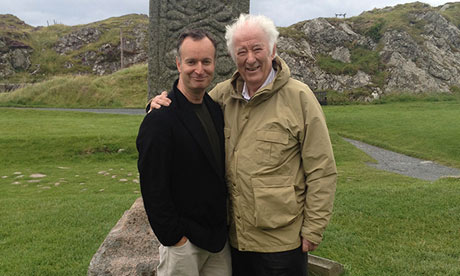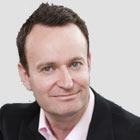Seamus Heaney was a great poet and friend, says Andrew O'Hagan, as he relives their travels in Scotland, Ireland and Wales – tucking into chowder and contemplating the afterlife

On the road … O’Hagan and Heaney on the island of Iona
He was simply a source of grace, a blessing, and you always knew he was on your side. I was lucky to know those qualities and see them captured in a single name – Seamus. What is it about some people that they seem to carry a kind of moral gladness with them?
Not that they are always good or always right, but that they hold out the possibility of a better selfhood for everybody. In the few days since he died, I've been feeling sore in the heart, because a light has gone out, a reliable comfort. More than that: a genius with a sublime human touch is now beyond reach. I recall the story of the little boy who watched as Robert Burns's funeral cortege passed through the town of Dumfries. "But who will be our poet now?" he said to his mother.
Two decades ago, when I worked at the London Review of Books, the editor, Karl Miller, would ask me to get people on the phone. Late one afternoon, when the paper was being put to bed, he had his nose about two inches from the page, a galley of Seamus's poem in tribute to Hugh MacDiarmid. "Seamus, I'm very grateful to you," said the editor to the poet down the line. "The problem is this. We're delighted with the poem, but there's a mistake in it.
("A mistake?" I imagined Seamus saying. "We can't have mistakes in the London Review of Books.")
"The thing is, you have this thing about MacDiarmid's 'chattering genius'. That's wrong. I'm from Scotland myself. You once said sheep chatter. And I can tell you Scottish sheep don't chatter, Seamus – they blether. Surely you mean MacDiarmid's 'blethering genius'?"
In more recent years, the three of us started going on jaunts together. Everywhere we went, Seamus was recognised, and people felt he might have made their day or changed their life. (It was part of his good nature that each claim seemed to have the same weight with him.) Three years ago, I went with him to the University of Strathclyde so that he could receive an honorary doctorate. His wife Marie and I thought he wasn't looking well and, indeed, he suffered a minor stroke before the event and was taken to the Royal Infirmary. Before the ambulance doors closed, he gave me his speech and told me to read it out. "They'll be waiting," he said. "I know you'll do some credit to the words."
More
Not that they are always good or always right, but that they hold out the possibility of a better selfhood for everybody. In the few days since he died, I've been feeling sore in the heart, because a light has gone out, a reliable comfort. More than that: a genius with a sublime human touch is now beyond reach. I recall the story of the little boy who watched as Robert Burns's funeral cortege passed through the town of Dumfries. "But who will be our poet now?" he said to his mother.
Two decades ago, when I worked at the London Review of Books, the editor, Karl Miller, would ask me to get people on the phone. Late one afternoon, when the paper was being put to bed, he had his nose about two inches from the page, a galley of Seamus's poem in tribute to Hugh MacDiarmid. "Seamus, I'm very grateful to you," said the editor to the poet down the line. "The problem is this. We're delighted with the poem, but there's a mistake in it.
("A mistake?" I imagined Seamus saying. "We can't have mistakes in the London Review of Books.")
"The thing is, you have this thing about MacDiarmid's 'chattering genius'. That's wrong. I'm from Scotland myself. You once said sheep chatter. And I can tell you Scottish sheep don't chatter, Seamus – they blether. Surely you mean MacDiarmid's 'blethering genius'?"
In more recent years, the three of us started going on jaunts together. Everywhere we went, Seamus was recognised, and people felt he might have made their day or changed their life. (It was part of his good nature that each claim seemed to have the same weight with him.) Three years ago, I went with him to the University of Strathclyde so that he could receive an honorary doctorate. His wife Marie and I thought he wasn't looking well and, indeed, he suffered a minor stroke before the event and was taken to the Royal Infirmary. Before the ambulance doors closed, he gave me his speech and told me to read it out. "They'll be waiting," he said. "I know you'll do some credit to the words."
More

No comments:
Post a Comment